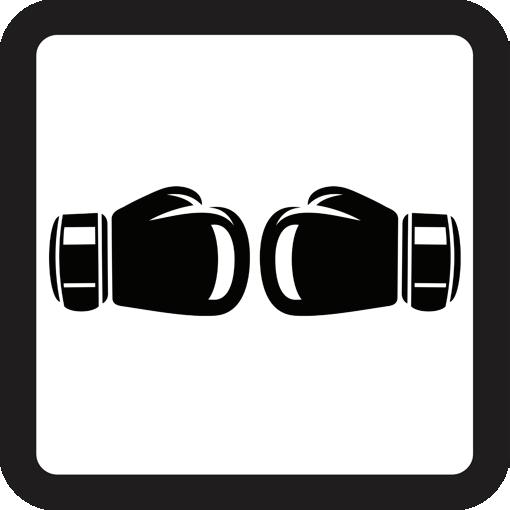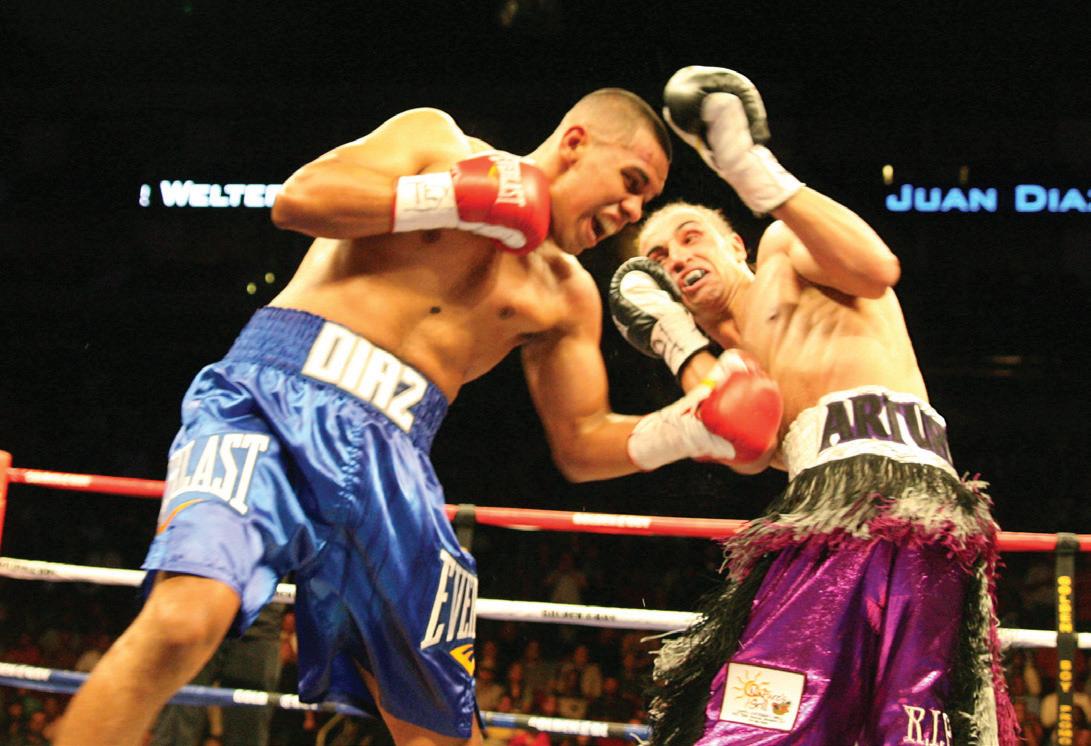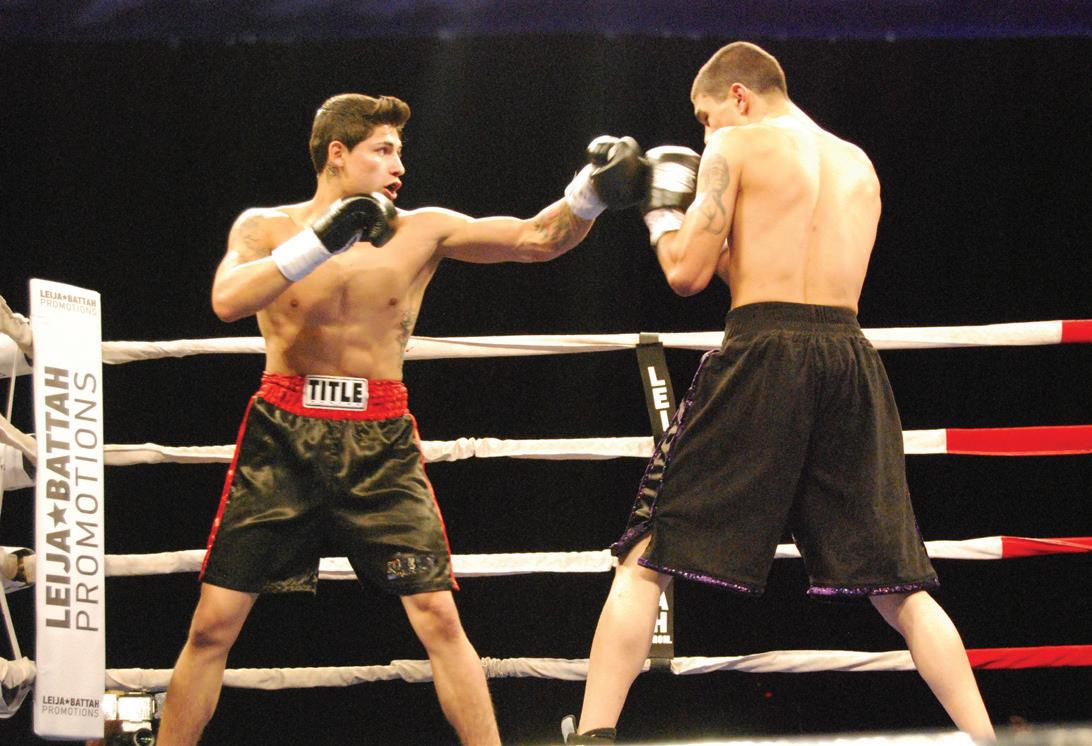
4 minute read
Combative Sports at a glance
Statutes: Chapter 2052, Occupations Code Rules: Title 16 T.A.C. Chapter 61 Practice Act? Title Act? No Yes Inspections? Yes Facilities? No Equipment? Yes Licenses: 3,088 (FY19) Individuals? Yes


Overview: The TDLR Texas Combative Sports Program regulates professional Boxing, Kick Boxing, Mixed Martial Arts, Muay Thai and amateur MMA, Muay Thai and Kick Boxing events in Texas. TDLR licenses contestants, promoters and referees in those sports. Texas ranks only second to California in the number of combative sports events held each year.
“Combative sports” means sports, including boxing, kickboxing, martial arts, and mixed martial arts, in which participants voluntarily engage in full contact to score points, to cause an opponent to submit, or to disable an opponent in a contest, match, or exhibition. The term does not include student training or exhibitions of students’ skills conducted by martial arts schools, or associations of schools, where the students participate for health and recreational purposes rather than competition and where the intent is to use only partial contact.
Professional combative sports contestants, promoters, referees, judges, seconds, matchmakers, managers, and event coordinators who officiate or participate in a regulated professional event must be licensed. Referees who officiate at regulated amateur events also must be licensed or registered by the TDLR executive director. Contestants Contestants who apply for a license must present documentation of recent blood test results that show they are free from hepatitis B virus, hepatitis C virus, human immunodeficiency virus, and any other communicable disease designated by commission rule. Applicants also must show the results of an ophthalmologic examination, as well as a complete yearly physical perfromed by an M.D. or a D.O. At the weigh-in, female contestants must submit to a pregnancy test; a positive test result is an automatic disqualifier. All licensing requirements for contestants must be completed at least 72 hours before an event.
TDLR will not issue a contestant license to anyone under the age of 17. Minors age 17 but not yet 18 may be issued a contestant’s license with notarized written consent from a parent or guardian. A person age 36 or older applying for a contestant’s license must submit a report of favorable physical testing conducted within the previous twelve months including but not limited to an EEG (electroencephalography) and an EKG (electrocardiogram). The applicant may request an administrative hearing if the executive director determines the physical testing results are not favorable in any way and fails to issue a license for that reason.
Promoters Anyone wanting to act as an event promoter must put up two surety bonds of $15,000 each. Promoters must make sure that all contestants scheduled to participate are licensed before the event; provide that an ambulance, serviced by at least two emergency medical technicians, is present on the premises where the event is held; provide for at least two physicians to be present during the event; provide for a physical examination of each contestant that complies with TDLR rules; and comply with all commission rules.
Medical Disqualifications After a bout, a ringside physician examines each contestant. Based on the post-contest examination, contestants will automatically receive rest periods, medical suspensions, or medical disqualifications for the following: ● Medical condition: any medical suspension will be based on the physician’s recommendation; ● Technical knockout: 30-day minimum medical suspension; ● Knockout: • First knockout: 60-day minimum medical suspension; • Two knockouts within twelve months: 120 days minimum medical suspension; • Three knockouts within twelve months or three consecutive knockouts: medical disqualification from further competition; and ● Mandatory rest: all contestants shall receive a mandatory rest period of three days of rest for each round fought, with at least a seven-day mandatory minimum rest period.
Medical disqualification of a contestant is for their own safety and may be made at the recommendation of the examining physician or TDLR. A contestant who disagrees with a medical disqualification, medical suspension or rest period set at the discretion of a ringside physician or a disqualification or suspension set by the department may request a hearing to show proof of fitness. The hearing shall be provided at the earliest opportunity after the department receives a written request from the contestant or his manager.
Program History In 1925, the Texas Penal Code outlawed “pugilistic encounters” between two men, or a fight between a man and a bull, or any other animal, for money or other thing of value. The Penal Code also outlawed moving picture films, bioscopes, vitascopes, magic lanterns or other device depicting prize fights.
In 1933, the Texas Legislature changed the law to allow combative sports, which were to be licensed by the Texas Commissioner of Labor Statistics (the forerunner of the Texas Department of Licensing and Regulation). That year, the Texas Legislature made lawful “the promoting, conducting, or maintaining of fistic combat or wrestling matches, boxing or sparring contests or exhibitions for money remuneration, purses or prize equivalent to be received by the participants or contestants, or where an admission fee thereto or therefore is charged or received.”
TDLR does not license professional wrestling, which is considered to be entertainment and not a combative sport.
Texas has three of the highest attendance records in the USA: ● Chaves vs. Whitaker, 1993 in San Antonio: 63,000 ● Pacquiao vs Clottey, 2010 at AT&T in Arlington: 51,000 ● Canelo vs. Smith, 2010 at AT&T in Arlington: 51,000.
The Combative Sports Advisory Board has 9 members serving 6-year terms, which includes: ● four physicians; ● one representative of a boxing promoter; ● one representative of a mixed martial arts promoter; ● one combative sports referee or judge licensed at least three years; ● one former combative sports contestant; and ● one public member.
License
Promoter’s License
Referee License Contestant
Fees
$900 + 2 surety bonds ($15,000) $125 $20


